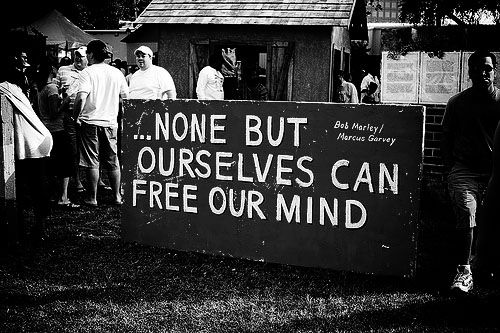‘One Love’ – Marcus “The Prophet” Garvey
‘One Love’ – Bob “The Profit” Marley
‘We are going to emancipate ourselves from mental slavery because whilst others might free the body, none but ourselves can free the mind.’ – Marcus “The Prophet” Garvey
“Emancipate yourself from mental slavery, none but ourselves can free our mind” – Bob “The Profit” Marley
Nowhere do the two great Jamaicans, Marcus Garvey and Bob Marley meet than in the phrases above. Potent phrases from Marcus Garvey that were meant to unify, free and uplift an oppressed Black race. When Bob Marley put Marcus Garvey’s words to songs, he most likely had the same intentions but somewhere along the way the phrases seems to have lost their original meanings. What was originally meant to break the chains of oppression became let’s get together, smoke weed and pretend everything is alright, all in the name of profit.
Marcus Garvey prophesy to Black people that they should “Look to Africa, when a black king shall be crowned, for the day of deliverance is near.” In 1930 when Haile Selassie was crowned in Ethiopia, the words of Marcus Garvey inspired men like Leonard Howell, Ferdinand Ricketts, Joseph Hibbert, Archibald Dunkley and Robert Hinds to start a new movement in Jamaica called “Rastafari”.
Haile Selassie’s title was Ras Tafari in addition to Lord of Lords, King of Kings and Conquering Lion of Judah all led to the belief that he was the reincarnation of God, the Black Messiah, the Savior, the Christ that was prophesy by Isaiah in the old testament.
Now, it is obvious that Bob Marley’s intention was to carry on the work of Marcus Garvey and he actually did an excellent job of it. Nowhere is it more evident than in the song “Africa Unite” where Bob Marley called for Africa to unite so her children scattered abroad could come home. The song is right in line with the Marcus Garvey back to Africa movement. In fact, in live performances of the song, Bob often sings “Marcus Garvey said it, so let it be done. We are the children of the African.”
In many instances the commercial success of Bob Marley in the international stage has clouded the pan-African agenda put forward by Marcus Garvey. The result of this commercialization has developed a pan-Africanism that has produced familiar slogans and rhetoric, while lacking the depth and insight needed for black people to forge forth a future in the 21st Century. Thus within this context Marley and Garvey represent two diametrically opposed figures, with Marley representing a neo-spiritualist/integrationist school and Garvey a nationalist school of thought.
Now the “One Love” from Marcus Garvey to Black people has become nothing more than a slogan for the Jamaica Tourist Board.
When Bob Marley asks us to “emancipate ourselves from mental slavery” it does not have the same meaning when Garvey asks us to “emancipate ourselves from mental slavery”.
While Marley spoke of the need for us to “Chant Down Babylon” one has to seriously look at the symbolic nature of “Babylon”. The idea of “Babylon” used by Rastafari speaks to the biblical city known for its corruption and exploitation of people and its destruction by god.
The concept is used to refer to any form of injustice and thus there is a universalism, which lacks historical and political specificity. Therefore Marley is able to “Chant Down Babylon” and call for “One Love” around the world and not be in philosophical contradiction.
Thus Marley’s call for mental emancipation is not specific to the historical and political situation of black people but appeals to all people and races.
Garvey’s “emancipate yourself from mental slavery” is a historical and politically specific call to black people to establish a new sense of self. The call was linked with the view on the part of Garvey that in order to reverse the calamities of history the black man needed to engage in a critical transformation of the mind.
The idea of mental emancipation was linked with Garvey’s political doctrine of ‘African Fundamentalism”. Garvey departs from the universalistic bent of Marley and engages in a discussion with Black people.
Bob Marley took the words of Marcus Garvey and made them more akin to the Snoop Dogg’s phrase “The game should be sold not told.” But this is not a game; this is life, life in a world where Black people are still mental slaves. Until Black people free their minds, the prophet must take precedence over the profit.
Share this:
This content was originally published here.

